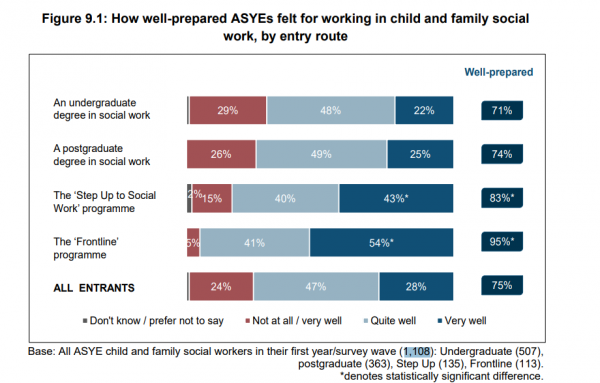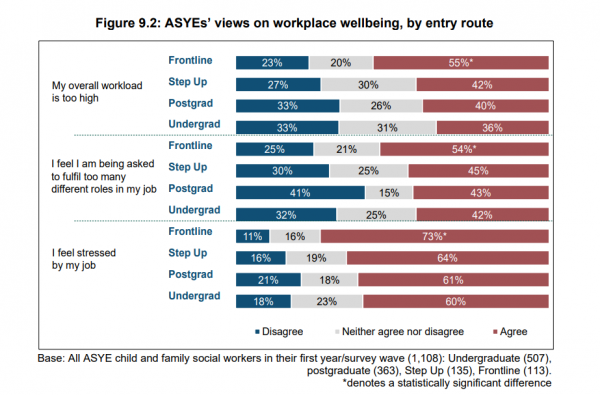
Graduates of fast-track training schemes feel more prepared for social work but experience greater stress and less satisfaction once in practice, research for the Department for Education (DfE) has revealed.
The ongoing longitudinal survey of local authority children’s practitioners has identified significant differences in the experiences of doing the assessed and supported year in employment (ASYE) between those who qualified through university programmes and those trained through Frontline and Step Up to Social Work.
How training routes differ
- Undergraduate degrees – three-year generic university course, with 70-day practice placement in year 2 and 100-day placement in year 3.
- Postgraduate degrees – two-year generic university course, with 70-day placement in year 1 and 100-day placement in year 2.
- Step Up to Social Work – 14-month specialist children’s course, delivered by partnerships of universities and employers, with placements delivered through host employer.
- Frontline – specialist children’s course, delivered by Frontline in partnership with local authorities where trainees are placed. Social workers qualify after first year and then take master’s alongside ASYE in year two.
Data collected from 1,108 ASYE social workers, from 2018-21, found that while 75% felt well-prepared by their courses for a career in children’s social work, this was true of 95% of Frontline graduates and 83% of Step Up trainees, compared with 74% with a postgraduate degree and 71% who qualified through an undergraduate course.

Source: Longitudinal study of
local authority child
and family social
workers (Wave 4), Department for Education (2022)
Researchers said this was, in part, to be expected, as Frontline and Step Up were focused on children’s social work, whereas university courses were generic. However, 94% of Frontline graduates, and 83% Step Up trainees, said they felt well-prepared for a career in social work in general, compared with 78% of master’s graduates and 75% who qualified through an undergraduate degree.
Frontline graduates ‘more stressed’
However, the reverse was true in relation to practitioner wellbeing, with Frontline graduates significantly more likely to report stress at work (73%) workloads that were too high (55%) and being asked to fulfil too many roles in their job (54%) than those who qualified through other routes.

Seventy per cent of those who felt stressed at work cited paperwork as a reason, with no significant differences between qualifying routes. However, in relation to the next most common factor, having insufficient time for direct work, this was cited by 70% of Frontline graduates experiencing stress, compared with 53% of newly qualified social workers (NQSWs) who felt stressed overall.
Reflecting this, just 3% of Frontline graduates reported spending at least 16 hours a week on direct work with children and families, compared with 13% of NQSWs overall.
Related articles
Researchers said this might reflect the fact that, while carrying out their assessed and supported year in employment, Frontline graduates also generally completed a master’s in advanced social work practice.
Just under three-quarters (74%) were satisfied, overall, with their role, with few differences between qualifying routes, except that Step Up graduates were significantly more likely to disagree that they were satisfied (17%) than university graduates (10%). There were also no significant differences in terms of how challenged NQSWs felt by their job (84% agreement) and the opportunities they had to develop their skills.
Differences in job satisfaction
However, other questions showed lower levels of satisfaction among fast-track graduates, compared with university counterparts:
- 11% of Step Up graduates were dissatisfied with the scope to use their initiative in their role and 17% with the sense of achievement they got from their job, compared with 5% and 8% overall, respectively.
- 21% of Frontline and 18% of Step Up graduates were dissatisfied with the influence they had over their job, compared with 12% overall.
- 38% of Frontline graduates were satisfied with their pay, compared with 47% overall.
- While 58% of NQSWs said they had the right resources to do their job, this dropped to 45% among Step Up graduates and 42% among those who trained through Frontline.
However, Step Up graduates were significantly more likely than average (87%, compared with 79%) to be intending to stay directly employed in local authority children’s social work 12 months on from when they were surveyed. Most of the rest of those polled – across all qualifying routes – intended to stay in the profession, either into the voluntary or private sector, an agency role for a local authority or into another area of social work, such as adults’ services.
The results chime with those from a separate study into the retention and progression of social workers trained through Step Up and Frontline, published last year.
This found that attrition rates from the profession were broadly similar between fast-track graduates and those trained through universities, but many trained through Frontline in particular experienced a “disconnect” between their training, particularly in systemic practice, and the realities of local authority practice.
Frontline ‘designed to prepare students for practice’
In response to the latest findings, from the longitudinal survey, Frontline’s chief social worker, Lisa Hackett, said: “We are delighted that Frontline programme participants felt well prepared for practice. Everything about the programme is designed to ensure this – not just what the participants learn but also the way they learn. Our approach means that participants learn on the job within a local authority, immersed in direct practice at the same time as learning about and applying theory to practice.
She added: “We know how hard the ASYE year can be for our participants, as they’re not only navigating their first year qualified but also without the support of their unit in the wider LA context, and as they study towards their master’s qualification at the same time.”
The DfE is due to tender for a new contract to deliver fast-track social work training from 2024 onwards after Frontline’s current contract expires, and Hackett said the department had proposed changes to relieve pressures on practitioners in their ASYE year.
“We welcome the DfE’s suggested changes to future iterations of this programme which will remove this additional pressure from the ASYE year,” she added. “While we currently have a strong support offer in place for all our participants, including dedicated coaching and mentoring, we are looking into how we, and our local authority partners, can further support participants during this time.”
‘No quick options for training social workers’
The longitudinal survey report was welcomed by the Joint University Council Social Work Education Committee (JUCSWEC), which represents university academics.
JUCSWEC chair Janet Melville-Wiseman said it was “encouraging” how well prepared those trained through undergraduate routes felt for children and families social work. She also suggested that a better comparator for assessing preparedness were university graduates whose final placements were with their subsequent employer, as this was typically the case for Frontline and Step Up students.
However, she raised concerns about the relatively negative responses around wellbeing reported by fast-track graduates.
“This resonates with our long-held view that it takes time to train and educate confident and resilient social workers,” she added. “It is time to ensure that we provide all students with the right balance between academic input and practice experience and with sufficient time to reflect on and prepare for the demands ahead.
“Just as there are very few quick fixes for children and families who need social work services, there are no quick options to prepare students for that increasingly complex task.”


 Family help: one local authority’s experience of the model
Family help: one local authority’s experience of the model  ‘I spent the first three months listening’: how supportive leadership can transform children’s services
‘I spent the first three months listening’: how supportive leadership can transform children’s services  How senior leaders in one authority maintain a culture of excellence
How senior leaders in one authority maintain a culture of excellence  How staff support ensures fantastic outcomes for children and families
How staff support ensures fantastic outcomes for children and families  Workforce Insights – showcasing a selection of the sector’s top recruiters
Workforce Insights – showcasing a selection of the sector’s top recruiters 

 Facebook
Facebook X
X LinkedIn
LinkedIn Instagram
Instagram
Sounds like very interesting research, I’ll have to read it in full. A thought on the greater sense of stress and less satisfaction; Frontline and Step Ahead specifically encourage participants (in a way I haven’t experienced as typical of under- or post-grad routes) to question social work and welfare systems, practices and orthodoxies that are well-established but often not helpful. I’d wonder if the greater dissatisfaction is less on a personal level and more about a greater focus on the parts of the system that do not work well enough for children, and having been encouraged to voice dissatisfaction at those things and push for them to change. Another thought it is that many graduates coming via university struggle to find LAs offering roles to ASYEs. That obviously isn’t an issue for those qualifying via fast tracks, so perhaps there is a greater sense of gratitude for having the role in the first place?
I completed a Masters in Social Work as a mature student the more I critique government policy, social work practice etc in my assignments the higher the mark, i received. Perhaps this explains why I too felt high stress levels and dissatisfaction with children’s services. I could see that we failed the families and children we worked with and that the system was not fit for purpose. Whereas some of my colleagues perhaps generally could not understand this because they had not been encouraged to critique and question.
It would be interesting to know the educational approach to SW of those that progress to managers it might explain a lot.
DfE research endorses DfE funded training as being more positive than the less well funded ones. I wonder if tomorrow the dawn will break, the sun rise, the dusk descend and the moon wax.